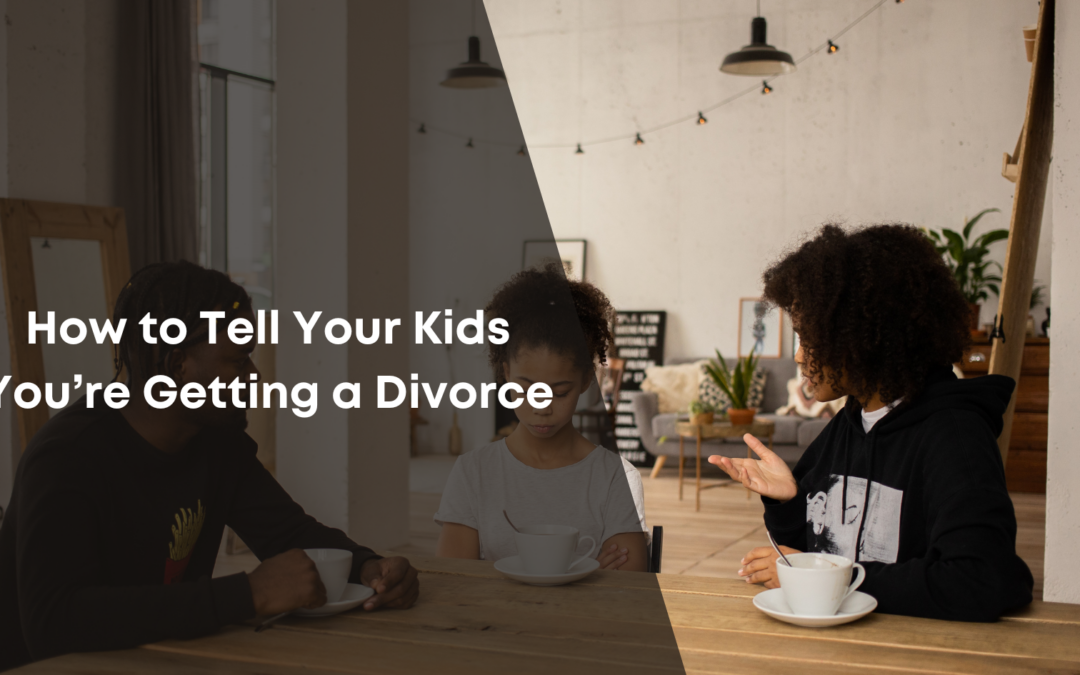It’s the moment you’ve been dreading: sitting your kids down and telling them that everything is about to change. You know it’s coming, and yet you can’t seem to find the words. How do you tell the people you love the most that their world is about to split in two? You’re not alone in wondering this—and how you handle this moment will shape their experience of the divorce for years to come.
The Hardest Part Isn’t Just What to Say—It’s What the Moment Represents
Telling your kids about your divorce isn’t a one-time conversation—it’s a turning point. One that can either give them a sense of safety… or leave them feeling like the ground has shifted beneath them.
The truth is, most parents don’t feel prepared for this. Nearly half of all children with divorced parents experience mental health challenges like anxiety or depression.¹ It’s easy to say too little, say too much, or—often without meaning to—shift blame onto the other parent. The result? Kids are left confused, scared, and unsure of who they can rely on.
And while you’re trying to protect them, you’re also carrying a heavy load. Maybe you’re battling guilt, afraid of saying the wrong thing, or wondering if this moment will leave lasting scars. You might be asking yourself, “How can I hold them together when I’m barely holding on myself?”
At the heart of it all, it just feels unjust. Children shouldn’t have to bear the emotional weight of their parents’ decisions. It’s deeply unfair that your kids have to face this kind of pain—especially when it wasn’t their choice.
But it doesn’t have to go that way. There is a way to have this conversation with clarity, compassion, and calm. A way that helps your kids feel secure, supported, and most of all—deeply loved.
A Better Way to Tell Your Kids About Divorce
My name is Steven Unruh, and I’ve been a divorce mediator for over 30 years. I’ve helped thousands of families navigate this difficult moment with grace. I know how hard this is—but I also know you can do this well.
The goal isn’t to make this moment painless—it’s to make it safe, honest, and constructive. The way you break the news can give your children the emotional security they need to adjust in a healthy way. Here’s how.
1. Talk to Your Children Together, If Possible
Children do best when they hear difficult news from both parents at the same time. This shows unity and helps prevent confusion or the sense that one parent is to blame.
-
Plan what you’ll say ahead of time.
-
Keep your tone calm and steady.
-
Use age-appropriate language.
Even if you and your spouse are struggling to be in the same room, your kids will benefit from seeing you work together for their sake.
2. Reassure Them: It’s Not Their Fault
Many kids—especially those between ages 6 and 12—blame themselves for their parents’ divorce. According to research from the American Academy of Pediatrics, children often assume their behavior caused the split.²
You must say, clearly and more than once:
“This is not your fault. Nothing you did or didn’t do caused this.”
Reinforce that both parents still love them deeply and that your love for them is unchanging.
3. Tell Them What Will Stay the Same
Divorce can feel like the rug is being pulled out from under them. You can anchor their emotions by focusing on what won’t change:
-
Their school and friends
-
Their routines
-
Their relationships with both parents
Predictability is a gift to kids during uncertain times. Be honest about changes, but emphasize stability wherever you can.
4. Give Space for Feelings and Questions
Don’t expect this to be a one-time talk. Your kids will process this slowly, in layers.
-
Let them cry.
-
Let them ask hard questions.
-
Don’t try to fix all their feelings.
The most important thing is to stay emotionally present. Your job is to listen and affirm that their emotions are valid, even if they’re difficult to hear.
5. Consider Divorce Mediation to Protect Your Kids
Children don’t just hear what you say—they feel how you treat each other. High-conflict divorces leave lasting marks, while cooperative divorces help children thrive.
Divorce mediation:
-
Reduces conflict between parents
-
Prioritizes the emotional well-being of children
-
Creates parenting plans that keep kids’ best interests in mind
A study from the Journal of Consulting and Clinical Psychology found that children whose parents used mediation had significantly better relationships with both parents even 12 years later.³ Mediation makes a lasting difference—not just in your life, but in theirs.
But What If You Don’t Feel Ready?
You might be thinking:
“I’m barely holding it together—how can I be strong for them?”
You don’t have to be perfect. You just have to be present. You can still be a great parent, even during a divorce. And you don’t have to do it alone.
You’re already doing something brave by seeking out guidance. That tells me everything I need to know about how much you care.
You Can Do This—And I Can Help
This is one of the hardest moments you’ll face as a parent—but you don’t have to navigate it alone. I’ve helped thousands of families through the emotional and legal chaos of divorce, and I can help yours too.
Let’s create a path forward where your children feel loved, secure, and supported—no matter what.
Schedule a free consultation today and take the first step toward a healthier, more peaceful transition for your family.


Recent Comments